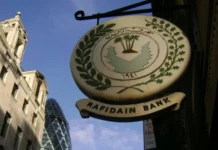Nizar Haidar Reveals: The Currency Auction Has Not Stopped Yet. Is The Government Silent About The Violations?
October 20, 2025 Last updated: October 20, 2025 Al-Mustaqilla/- Political analyst Nizar Haider revealed in a television interview interesting information about the continued operation of the currency auction platform in Iraq, despite the government’s announcement and Prime Minister Mohammed Shia al-Sudani’s promises to halt it as of January 1, 2025.
According to Haider, the Central Bank of Iraq continues to sell dollars through the auction platform, in clear violation of government directives.
The government has repeatedly announced its intention to end this controversial mechanism, which has long been the subject of accusations of corruption and waste of public funds.
Haider explained that the amount of money traded in the auction so far exceeded $70 billion, which he described as “reflecting the persistence of the old financial system that Al-Sudani promised to dismantle but has so far been unable to do so.”
This revelation comes amid escalating public and parliamentary debate over the Central Bank’s policies and its role in controlling the exchange rate.
It also raises growing doubts about the viability of the current platform, which many experts view as a gateway for transferring hard currency abroad.
Meanwhile, the Central Bank of Iraq has yet to issue an official comment on these accusations, amid growing questions about the government’s seriousness in implementing its decision to halt the currency auction and the real reasons behind the platform’s continued operation. https://mustaqila.com/نزار-حيدر-يكشف-المزاد-العملة-لم-يتوقف-ح/
The Central Bank Announces That The Public Debt Ratio Does Not Exceed 43 Percent And Is Within Safe Limits.
Sunday, October 19, 2025 | Economic Number of readings: 277 Baghdad/ NINA / The Central Bank of Iraq announced that the public debt ratio does not exceed 43 percent, indicating that it is within safe limits. The bank said in a statement today, Sunday:
“In the framework of financial transparency and to clarify what is included in the public debt and deficit data, the Central Bank of Iraq would like to clarify what was reported in the media, that the planned deficit in the three-year general budget law approved by the House of Representatives for the years (2023, 2024, 2025) amounted to 191.5 trillion dinars, while the actual deficit for the three years mentioned amounted to 35 trillion dinars, which was covered internally with bonds and transfers and in accordance with the chapters included in the budget law.”
He pointed out that “actual borrowing reached 18.2% of the planned deficit stipulated in the budget law,reflecting the high level of coordination between the government and the Central Bank of Iraq in controlling public debt and preventing it from reaching the high levels stipulated in the budget law.”
He added, “The external debts due do not exceed $13 billion after excluding (the outstanding and unclaimed debts of the former regime), and Iraq has not defaulted on any obligation, maintaining an excellent financial reputation regionally and internationally in this regard.”
He indicated that “the internal debt of 91 trillion dinars represents 56 trillion dinars accumulated until the end of 2022,and the added amounts are 35 trillion dinars of debts for the years (2023, 2024, 2025), and most of the internal debt is within the government banking system.”
He pointed out that “given the government’s accounts and deposits in state-owned banks, specialized committees and international consulting firms are working to convert a portion of these debts into investment vehicles within a national fund to manage domestic debt, with the aim of transforming obligations into investment opportunities.”
He emphasized that “the ratio of public debt to GDP did not exceed 43%, and this ratio – according to internationally recognized classification – is moderate and within safe limits, and does not constitute a burden on the economy.
” He added: “The Central Bank of Iraq is working to present a comprehensive vision for financial sustainability for the coming years, supporting the government’s comprehensive reform efforts to diversify the economy and maximize non-oil revenues as an alternative to sole reliance on oil revenues and avoiding a fiscal deficit.”
https://ninanews.com/Website/News/Details?key=1257729
Mazhar Saleh: The External Debt Does Not Exceed $9 Billion, And Its Settlement Is Being Carried Out With High Transparency.
Time: 10/19/2025 15:56:44 Reading: 60 times {Local: Al Furat News} The Prime Minister’s financial advisor, Mazhar Mohammed Salih, confirmed on Sunday that there is a vague picture regarding the interpretation of Iraq’s foreign debt, indicating that the foreign debts due until 2028 do not currently exceed $9 billion, a commitment that likely constitutes half of the country’s total foreign debt.
Saleh explained in an interview with Al Furat News Agency that “there are coordinated payment mechanisms between the Ministry of Finance and the Central Bank of Iraq, which are highly governed and transparent.
They are settled annually with precision within a strict program and allocations in the federal general budget, and are periodically extinguished with the international creditor community.”
He added that “the total external debt does not exceed what was mentioned above, and what was mentioned in the letter of the Central Bank of Iraq recently and circulated in the media about the inflated amounts regarding Iraq’s external debt, requires a lot of explanation and shedding of light, indicating that
Iraq is not obligated to pay the outstanding portion of it amounting to $41 billion that was traded as a real external debt, while in reality it is not, because the aforementioned balance is subject to the settlements of the Paris Club agreement of 2004, which undertook to write off 80% or more of that external debt, explaining that the balance relates to financing the Iraq-Iran war, and all of them are considered pre-1990 debts under the Paris Club agreement.”
He explained that “the domestic debt referred to in the Central Bank’s letter is the result of the accumulation of financial, security, and health crises that the Iraqi economy has been exposed to over the past decade, since the war on ISIS terrorism.
This has been accompanied in recent years by severe international geopolitical factors that have exposed global oil markets to a price decline due to the slowdown in global economic growth.
” Saleh pointed out that “the borrowing undertaken by the current government as domestic debt constitutes only 18% of the total precautionary domestic debt included in the federal general budget (the three-year budget) pursuant to Law No. 13 of 2023 for the years 2023-2025, indicating that the domestic debt, amounting to approximately 91 trillion dinars, is mostly held by the government banking system and under high-level financial and technical management.”
He pointed out that “specialized committees, in cooperation with international consulting firms, are working to convert a large portion of the domestic public debt into productive investment vehicles within a national fund for domestic debt management, with the aim of stimulating the real economy and transforming debt obligations into investment opportunities in the real sector of the Iraqi economy.”
Saleh concluded by pointing out that the country is currently experiencing its most stable period, thanks to the strength of foreign reserves held by monetary policy, which play a significant role in stabilizing the purchasing power of the Iraqi dinar and achieving sustainable development. https://alforatnews.iq/news/مظهر-صالح-الدين-الخارجي-لا-يتجاوز-9-مليارات-دولار-وتسويته-تتم-بشفافية-عالية
A 5-Point Explanation That Demolishes The Assumptions Of Deficit And Public Debt
Local — A responsible government source revealed on Sunday that the government has succeeded in reducing the deficit, while pointing out that some are trying to hold the government responsible for the debts of the previous era. The source said,
“Based on the recent statement issued today by the Central Bank regarding the deficit, debt, and cash reserves, and to clarify what has been raised in some media outlets and on social media over the past two days, we would like to clarify the following facts to the public:
1- The latest statement issued by the Central Bank of Iraq clearly confirmed that the total external debts due do not exceed (13) billion dollars, noting that about (4) billion dollars of them represent debts dating back to before 2003, and were subsequently rescheduled and settled according to financial arrangements agreed upon with the creditors.
Note that more than half of the total external debts are not due before 2028.
2- Unfortunately, some are trying to hold the current government responsible for the debts of the previous era (the debts of the previous dictatorial regime), which exceeded (40) billion dollars, and which are not due for repayment, as they are being settled or significantly reduced within the framework of the Paris Club, or other relevant international agreements.
3- The Central Bank’s statement showed that the planned deficit in the three-year general budget law (2023-2025) amounted to approximately 191.5 trillion dinars, while the actual deficit during the same period amounted to only about 35 trillion dinars.
This means that the government succeeded in reducing the deficit by a very significant percentage compared to what the House of Representatives approved in the budget law.
Only 18% of the planned deficit has been financed, which is a major financial achievement that reflects the discipline of financial policy and the rational management of resources.
4- The Central Bank indicated that the public debt-to-GDP ratio does not exceed 43%, a safe percentage by international standards.
Furthermore, Iraq has not defaulted on any external obligations, thanks to ongoing coordination between the Ministry of Finance and the Central Bank.
Iraq’s position toward external creditors is among the best in the region, as it enjoys a solid financial reputation and high credibility in fulfilling its international obligations.
The source also indicated that 5- the government has formed specialized technical committees, with the assistance of international consulting firms, to restructure the public debt.
The committees have completed the first phase of their work and submitted recommendations addressing approximately 20 trillion dinars, which will be converted into investment vehicles, awaiting approval by the Council of Ministers.
This is an important step taken by the current government and represents a new and different approach to public debt management from previous policies, as it aims to transform financial obligations into productive investment opportunities that support economic growth and enhance financial sustainability.
He stressed that “these indicators—which have been distorted by those who seek to distort their true nature— reflect the current government’s success in significantly reducing the fiscal deficit and reducing reliance on borrowing, while maintaining the stability of foreign exchange reserves and enhancing Iraq’s financial reputation internationally.”
He explained that “restructuring the public debt and converting a portion of it into investment vehicles represents a qualitative step within the path of sustainable financial and economic reform that the government is working to implement.”
He explained that “these measures are part of the government’s approach aimed at enhancing financial sustainability, strengthening confidence in the state’s monetary and fiscal policy, and maintaining high levels of foreign exchange reserves, which are among the highest in Iraq’s modern history.” https://economy-news.net/content.php?id=61350
For current and reliable Iraqi news please visit: https://www.bondladyscorner.com






